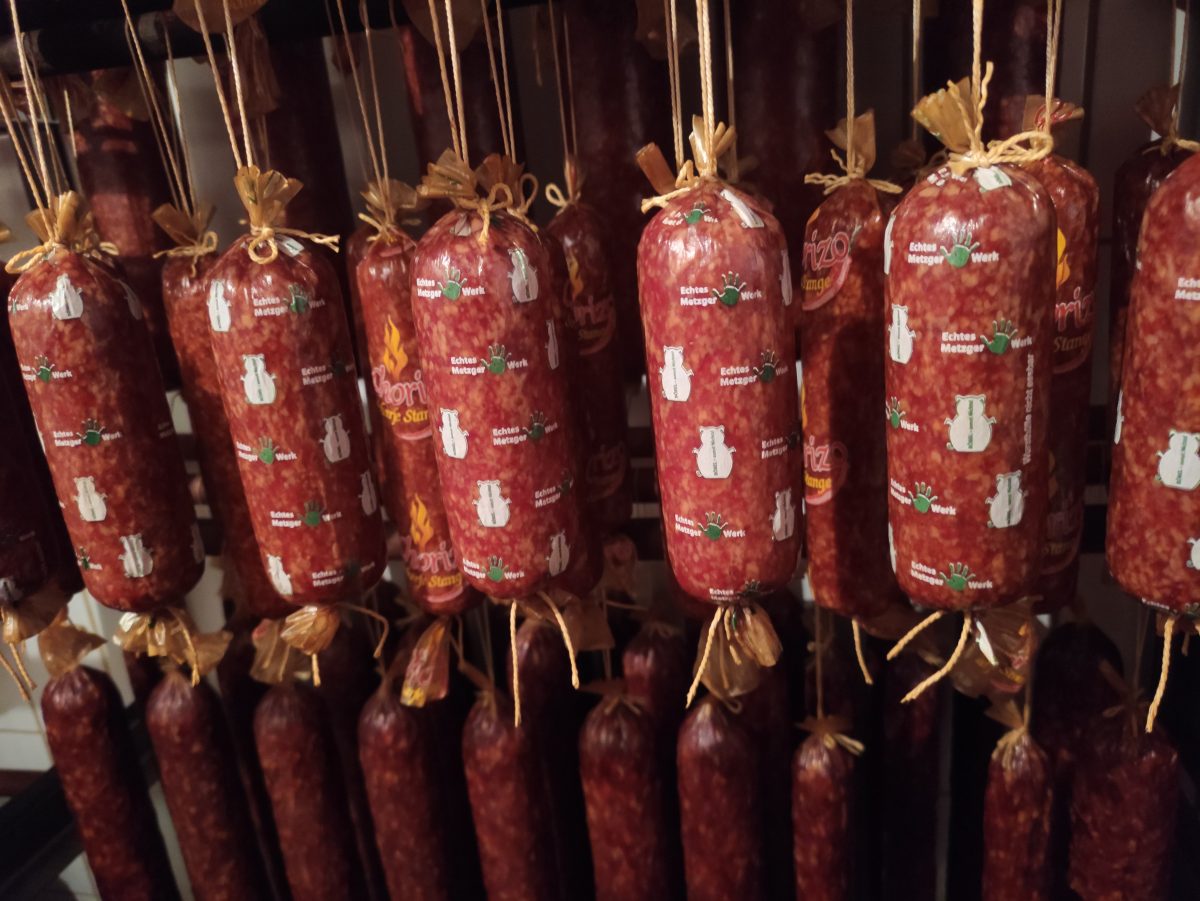
Man kann Lebensmittel mit nur einem Schritt (Gefrieren, Erhitzen, …) haltbar machen oder durch die Kombination verschiedener Schritte. Das nennt sich Hürdenkonzept. Es wird eingesetzt um durch das Zusammenspiel der einzelnen Schritte die Haltbarkeit zu erzielen.. Jeder einzelne Faktor: Temperatur, Salz, Sauerstoffangebot, Trocknung, Konkurrenzflora, pH-Wert und Rauch stellt ein Hindernis/ eine Hürde für die Mikroorganismen dar. Einige Mikroorganismen können vielleicht die ersten Hürden noch überleben, aber spätestens bei den wichtigsten Hürden (grün umrahmt) wird es dann schwierig. Im folgenden ist das Hürdenkonzept an einem praktischen Beispiel erklärt:
| Hürde | Sicherheit | Auswirkung auf die Qualität |
| t-Wert = niedrige Temperaturen beim Kühlen & Gefrieren | Wachstumshemmung der Mikroorganismen | |
| NPS = Nitritpökelsalz | mikrobiologische Stabilität des Produktes Hemmung unerwünschter Mikroorganismen | Bildung der Pökelfarbe Bildung des Pökelaromas |
| Eh-Wert = Sauerstoffangebot/ -verfügbarkeit | Senkung des Eh-Wertes durch Füllen unter Vakuum Absterben der Mikroorganismen, die auf Sauerstoff angewiesen sind erwünschte Mikroorganismen enthalten Selektionsvorteil | Stabilisierung der Rohwurst Vermehrung der aeroben = sauerstoffliebenden Mikroorganismen und dadurch Farb- & Geschmacksfehler wären in den Hohlstellen möglich |
| aW-Wert = verfügbares Wasser für Wachstum & Vermehrung von Mikroorganismen | Abtrocknen der Rohwurst an der Oberfläche | |
| Konkurrenzflora = Starterkulturen | unterdrücken unerwünschter Mikroorganismen | Verbesserung des Geruchs & Geschmacks |
| pH-Wert | pH-Wert sinkt mit der Entwicklung der Milchsäurebakterien Senkung beeinflussbar über: Zuckermenge, Reifetemperatur, … | Säuerung Haltbarkeit Geschmack |
| Rauch | Oberflächenabtrocknung Konservierung | Aromatisierung Haltbarkeit |
| aW-Wert | aW-Wert sinkt mit zunehmender Reifung Senkung beeinflussbar über: relative Luftfeuchtigkeit, Temperatur in der Reifekammer, … | Trocknung Aromabildung |
Hurdle technology
It´s possible to preserve groceries with only one step (freezing, cooking, …) or to use a combination of different steps. That`s called hurdle technology. It`s used to preserve groceries through a combination of different steps.
Each factor: temperature, salt, amount of oxygen, drying, competitive flora, pH value and smoke is a hurdle microorganisms.
Some microorganisms can survive the first hurdles, but the most important hurdles (green outline) are hard to survive. I am going to explain you the hurdle technology of raw sausage/ salami below:
| Hurdle | safety | impact on the quality |
| t-value = low temperature during chilling & freezing | growth inhibition of microorganisms | |
| NPS = nitrite salt | microbiological stability of the product growth inhibiting of unwanted microorganisms | development of the curing colour development of the curing aroma |
| Eh-value = availability of oxygen | reduction of Eh-value through vacuum-filling dying of microorganisms which need oxygen selection advantage for wanted lactic acid bacteria | stability of raw sausage/ salami reproduction of aerobic = oxygen loving microorganisms and colour- & taste faults would be possible in hollow areas |
| aW-value = amount of water which microorganisms can use for growth and reproduction | drying on the surface of casing | |
| competitive flora = starter cultures | suppressing of unwanted microorganisms | improvement of smell & taste |
| pH-value | reduction of the pH-value with the development of lactic acid bacteria effect on reduction via amount of sugar, maturation temperature, … | acidification durability taste |
| smoke | drying preservation | aromatisation preservation |
| aW-value | reduction of the aW-value during maturation effect on reduction via relative humidity, temperature, … | drying aromatisation |

